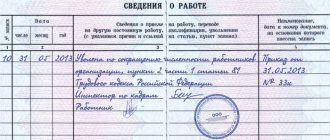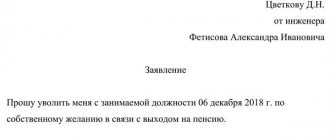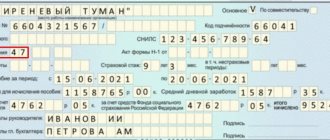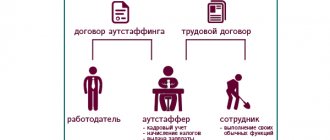IN THE NIKULINSKY DISTRICT COURT OF MOSCOW Plaintiff: L.R.V. Moscow region, Odintsovo district, st. Novaya, 7, apt. 3 for correspondence/notifications : lawyer Khoruzhenko A.S. Legal bureau "Moscow legal" Moscow, st. Maroseyka, 2/15 tel Defendant: LLC "E." 20__02, Moscow, Akademika Anokhin St., 2, building 7 Third party: Nikulinskaya Interdistrict Prosecutor's Office 20__02, Michurinsky Prospekt, 3, Olympic Village
ASK:
- Declare illegal and cancel order No. 12-k dated September 16, 20__ on the dismissal of the Plaintiff - L.R.V.;
- Reinstate the Plaintiff – L.R.V. at work in the previous position;
- To recover from the Defendant – LLC “E.” in favor of the Plaintiff, funds as compensation for the period of forced absence from 09.16.20__ to the present;
- To recover from the Defendant – LLC “E.” in favor of the Plaintiff, funds as compensation for moral damage in the amount of 100,000 rubles;
- To recover from the Defendant – LLC “E.” legal costs, in proportion to the satisfied part of the claims;
- Please notify the legal bureau “Moscow Legal” of the date and time of the court hearing, Moscow, st. Maroseyka, 2/15,
Statement of claim for reinstatement and recovery of wages
| In ______________________________ court address: ______________________________ Plaintiff: Full name____________________ address: _____________________________ Defendant: Full name ______________________ address: _____________________________ Price of the claim: ________________ rubles. |
Statement of claim for reinstatement and recovery of wages
DD.MM.YY.
between LLC ___________________ (Employer) and full name _________________ (Employee) an employment contract No. _______ dated DD.MM.YY was concluded. (Hereinafter referred to as the Agreement). According to clause ______ of the Agreement, the employee is hired by LLC ___________________ for the position ______________________________. The employee’s responsibilities included: ___________________________ ___________________________ (clause_____ of the Agreement). In accordance with paragraphs. _____ of the Agreement The Employer pays the Employee a salary for the reporting month in the amount of ______________ rubles. The deadline for payment of wages to the Employee is by ______ the date of the current month for the past month.
DD.MM.YY. The employer issued order No. ______, in accordance with which I was fired due to loss of confidence.
In accordance with paragraph 7 of Art. 81 of the Labor Code of the Russian Federation An employment contract can be terminated by the employer in cases of guilty actions by an employee directly servicing monetary or commodity assets, if these actions give rise to a loss of confidence in him on the part of the employer. In accordance with paragraph 45 of the Resolution of the Plenum of the Supreme Court of the Russian Federation dated March 17, 2004 N 2 (as amended on September 28, 2010) “On the application by the courts of the Russian Federation of the Labor Code of the Russian Federation,” courts must keep in mind that termination of an employment contract with an employee by paragraph 7 of part one of Article 81 of the Code in connection with loss of trust is possible only in relation to employees directly servicing monetary or commodity assets (reception, storage, transportation, distribution, etc.), and provided that they have committed such guilty actions, which gave the employer grounds for losing confidence in them. If it is established in the manner prescribed by law that theft, bribery and other mercenary offenses have been committed, these employees may be dismissed on the grounds of loss of confidence in them and in the case when these actions are not related to their work.
I performed my job duties properly, and the Defendant had no complaints about my work. My responsibilities did not include servicing monetary or commodity valuables; no guilty actions were committed on my part, and certainly no facts of theft, bribery or other mercenary offenses. To this day, it is not clear to me why the order for my dismissal was issued. Thus, my dismissal under clause 7 of Art. 81 of the Labor Code of the Russian Federation is far-fetched and unfounded. In accordance with Art. 22 of the Labor Code of the Russian Federation, the employer is obliged to: comply with labor legislation and other regulatory legal acts containing labor law norms, local regulations, terms of the collective agreement, agreements and employment contracts. However, the employer grossly violated the provisions of the law on the procedure for dismissing an employee, thereby violating the rights and legitimate interests of Alexander Ivanovich Artemov. The employer also did not follow the dismissal procedure. In accordance with Art. 193 of the Labor Code of the Russian Federation, before applying a disciplinary sanction, the employer must request a written explanation from the employee. In violation of this norm, no explanation was required from me.
In connection with the above, I consider my dismissal to be illegal, carried out in gross violation of the dismissal procedure established by labor legislation.
According to the provisions of Art. 129 of the Labor Code of the Russian Federation, wages are remuneration for work depending on the qualifications of the employee, complexity, quantity, quality and conditions of the work performed, as well as compensation payments and incentive payments (additional payments and incentive allowances, bonuses and other incentive payments). In accordance with paragraph. 15th century 22 of the Labor Code of the Russian Federation, the employer is obliged to pay the full amount of wages due to employees within the time limits established in accordance with this Code, the collective agreement, internal labor regulations, and employment contracts. In accordance with Art. 236 of the Labor Code of the Russian Federation If the employer violates the established deadline for payment of wages, vacation pay, dismissal payments and (or) other payments due to the employee, the employer is obliged to pay them with interest (monetary compensation) in the amount of not less than one three hundredth of the current amount at that time refinancing rates of the Central Bank of the Russian Federation from amounts not paid on time for each day of delay starting from the next day after the established payment deadline until the day of actual settlement inclusive. The amount of monetary compensation paid to an employee may be increased by a collective agreement, local regulation or employment contract. The obligation to pay the specified monetary compensation arises regardless of the employer’s fault.
At LLC __________________ I work from DD.MM.YY. for the entire period of work I was paid wages __________________ rubles, I was not paid any more wages. The amount of unpaid wages for the period from DD.MM.YY. according to DD.MM.YY. is ________________ rubles (____________ rubles monthly salary * _____ months of delay). The deadline for payment of wages is until the _________ day of the current month for the previous month. Accordingly, the period of delay is: - for MM.YY. (DD.MM.YY. - DD.MM.YY.) - _______________ rubles. - for MM.YY. (DD.MM.YY. - DD.MM.YY.) - _______________ rubles. - for MM.YY. (DD.MM.YY. - DD.MM.YY.) - _______________ rubles. The total penalty is ______________________ rubles.
Payment for forced absence for MM.YY. is _________ rubles.
In accordance with Art. 394 of the Labor Code of the Russian Federation In cases of dismissal without legal grounds or in violation of the established procedure for dismissal or illegal transfer to another job, the court may, at the request of the employee, make a decision to recover in favor of the employee monetary compensation for moral damage caused to him by these actions. The amount of this compensation is determined by the court. In connection with the illegal dismissal on far-fetched grounds, which included discrediting my good name, I experienced moral and moral suffering, the amount of which I estimate at _________________ rubles.
Based on the above, and in accordance with Art. Art. 131, 132 Code of Civil Procedure of the Russian Federation, Art. 333.36 of the Tax Code of the Russian Federation, I ask the court :
1. Reinstate _______________’s full name at work at LLC ___________________ (TIN: _____________) in the position of ________________________. 2. To recover from the LLC ___________________ (TIN: _____________) in favor of the full name _________________ ___________________ rubles, of which the arrears of wages amount to ________________ rubles, monetary compensation for violation of the terms of payment of wages _______________ rubles. 3. To recover from LLC ___________________ (TIN: _____________) in favor of the full name _________________ compensation for moral damages for illegal dismissal in the amount of __________________ rubles.
Appendix: 1. Copy of the statement of claim – 1 copy. 2. Copy of Employment Contract No._____ dated DD.MM.YY. – 1 copy. 3. Copy of order No._____ dated DD.MM.YY. – 1 copy. 4. A copy of the order to terminate the employment contract – 1 copy; 5. Extract from the Unified State Register of Legal Entities in relation to LLC __________________________.
/________________/FULL NAME
Lawsuit - general points
When drawing up any claim, the applicant will certainly be faced with a number of general issues that need to be clarified:
- The claim we have identified, in accordance with Articles 23 and 24 of the Code of Civil Procedure of the Russian Federation, must be considered by the district court. According to clause 6.3 of Article 29 of the Code of Civil Procedure of the Russian Federation, you can go to court both at the place of registration of the organization (branch) and at the place of residence of the dismissed employee.
- For claims of this kind, it is not necessary to pay state duty due to the benefits specified in subparagraph 1 of paragraph 1 of Article 333.36 of the Tax Code of the Russian Federation.
- An assessment of the amount of claims should be carried out only in the case of collection of amounts due upon dismissal, average earnings that were lost during the period of absenteeism due to the fault of the organization, or collected as compensation for moral damage. Otherwise, it will be a claim of a non-property nature (i.e. a claim for which the price is not determined).
- As for the requirements, the employee can either apply for reinstatement and present related material claims, or demand that the organization change the basis that is used for dismissal. The right to such a choice is secured by Article 391 of the Labor Code of the Russian Federation.
- According to Part 1 of Article 392 of the Labor Code of the Russian Federation, after receiving a copy of the order (work book), the employee has 1 month to go to court. Article 154 of the Code of Civil Procedure of the Russian Federation also gives the court 1 month to consider the issue.
The employee wrote a letter of resignation without specifying the date
In the resignation letter submitted to the employer, there was neither the date of drawing up the document nor the date of dismissal. In the lawsuit, the employee explained this by saying that he initially did not intend to quit, and wrote the application under pressure.
The boss, before giving the application to the personnel officers, himself counted down two weeks until the beginning of the month.
The employee went to court.
The court's decision
The court supported the employee and pointed out important details:
- the parties did not reach an agreement on termination of the employment contract at the initiative of the employee;
- there is no evidence of agreement with the plaintiff on the date of dismissal;
- when dismissing at his own request, the employer was not convinced of the employee’s will;
- The Labor Code does not provide for the employer to independently determine the date of dismissal of the employee at his own request without the consent of the employee;
- filing a lawsuit to declare the dismissal illegal is precisely proof of the lack of voluntary expression of will.
Convenient employee accounting, salary calculation, sick leave, vacation pay, taxes and contributions, dividend calculation.
To learn more
There was an accident in the apartment
The employee did not go to work due to a break in the hot water supply lines, which resulted in an accident in his apartment. The employer regarded his absence as absenteeism and fired him for a single gross violation of labor duties (clause “a”, clause 6, part 1, article 81 of the Labor Code of the Russian Federation). He issued an order in which the following were given as evidence of truancy:
- act on the absence of the employee from the workplace from 08.00 to 16.18 hours;
- memo from the head of the HR department;
- notification “On the need to provide written explanations”;
- explanatory statement of the employee;
- a copy of the minutes of the meeting of the personnel commission.
The dismissed employee went to court to be reinstated at work. From a memo from one of the employees, it turned out that the dismissed employee on the day of the accident notified her that it was impossible to go to work at 8.20.
In the explanatory note, the employee indicated the reason for his absence from work - a utility failure in the apartment.
The court's decision
The first instance agreed with the dismissal. The written evidence presented was considered, as well as the testimony of witnesses: the chairman and plumber of the HOA, the plaintiff’s mother. It turned out that the accident in the apartment was eliminated between 12.00 and 13.00.
The court proceeded from the fact that the plaintiff had no reason to be absent from work after the accident was repaired. Therefore, absence from work was regarded as absenteeism. Other reasons were also taken into account: the dismissed employee did not inform his immediate supervisor about the reason for his absence, and also did not take measures to resolve the problem - for example, he could have asked for leave without pay.
But the appellate court supported the employee. He indicated that:
- the employee was absent from work after 13.00 and before 16.18 for less than 4 hours, which, according to the Labor Code of the Russian Federation, is not absenteeism;
- the fact that the employee did not report the absence to his immediate supervisor and did not take measures to coordinate the situation is not a disciplinary offense.
The court concluded that the dismissal did not have a legal basis, as a result of which the employee suffered moral damage. Compensation for moral damage was recovered in his favor - 5,000 rubles.
Snowfall prevented a worker from leaving the village for work
The employee went out of town for the weekend in his personal car, but was unable to return on the working day as snow fell and the roads were covered.
The employee informed the immediate head of the department about his absence. The municipal service managed to clear the street in the village on a working day between 16.00 and 17.00.
An employer fired an employee for absenteeism.
The court's decision
In this case, the courts' decision was ambiguous. For example, the first and appellate instances recognized the dismissal as legal, considering that the employee should be more careful and take measures to return to the city in advance in case of bad weather.
But the Supreme Court took a closer look at the details. He noticed that the employee was making attempts to go into the city, and therefore called a tractor to clear the road.
As a result, the Supreme Court sent the case for a new trial.
The employee left work early on his birthday
On one day, the employee was absent from work for more than 4 hours in a row. But this absence was agreed upon with the immediate supervisor due to the company’s established practice of ending the workday early on a birthday.
The employer considered that this was the reason for issuing a dismissal order under paragraphs. “a” clause 6, part 1, art. 81 Labor Code of the Russian Federation. An act was drawn up to conduct an internal investigation into the commission of a disciplinary offense.
The court's decision
So far, even the court has not come to a clear opinion on this dispute. So, in particular, the first instance supported the ex-employee and canceled the dismissal. But this decision was overturned by the appeal ruling of the judicial panel for civil cases.
The court needed to find out:
- what was the reason for leaving work earlier than established by the internal labor regulations;
- whether the immediate supervisor was notified of the need to leave and for what reasons;
- whether the early departure from work was due to valid reasons.
To resolve the issue of the legality of dismissal for absenteeism, the appellate court should have established:
- whether the employer, when imposing a disciplinary sanction in the form of dismissal, took into account the severity of the offense committed and the circumstances under which it was committed;
- the employee's previous behavior;
- his attitude towards work.
As a result, it was decided to send the case for a new appeal hearing.











